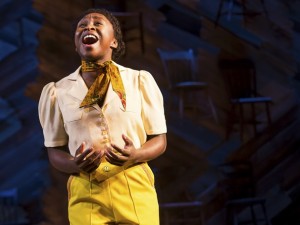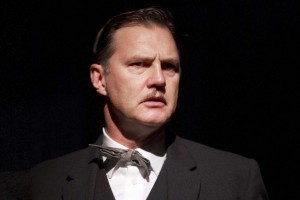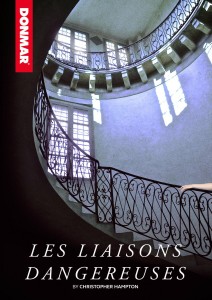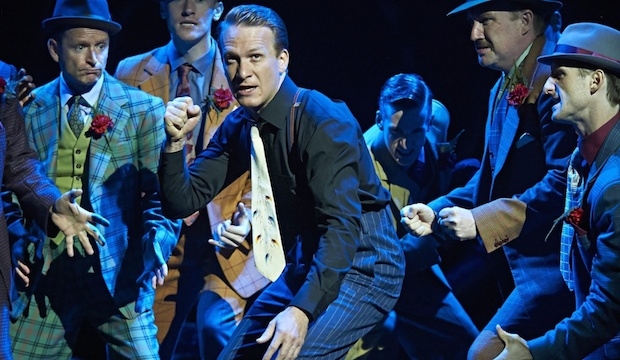THE MENIER CONQUERS BROADWAY (AGAIN) AND CYNTHIA ERIVO BECOMES AN OVERNIGHT STAR
 London’s Menier Chocolate Factory have just scored their fourth Broadway hit: after previously transferring Sondheim’s Sunday in the Park with George and A Little Night Music, and Jerry Herman’s La Cage Aux Folles, to Broadway after runs in the West End first, this time they’ve by-passed the West End to go direct to Broadway with The Color Purple and take coals to Newcastle once again, returning a musical ‘home’ whose original production only closed 7 years ago.
London’s Menier Chocolate Factory have just scored their fourth Broadway hit: after previously transferring Sondheim’s Sunday in the Park with George and A Little Night Music, and Jerry Herman’s La Cage Aux Folles, to Broadway after runs in the West End first, this time they’ve by-passed the West End to go direct to Broadway with The Color Purple and take coals to Newcastle once again, returning a musical ‘home’ whose original production only closed 7 years ago.
And even if the headline star is Oscar-winner Jennifer Hudson, absolutely universal raves greeted the Broadway revival of our very own Cynthia Erivo. (But can we have her back, please, when you’re done with her?)
She is variously described as “an incandescent new star” (New York Times), “an absolute marvel” (Associated Press), “transcendent, indelibly present, lucid, unflinching and rigorously honest, profoundly moving, emotionally raw, affecting, the real deal, not to be missed” (Hollywood Reporter),”a performance of magnetic directness and simplicity” (Time Out New York), “the tiny point of dynamite” (Variety), “spectacular” (New York Daily News), “,masterful” (vulture.com), “remarkable, astonishing, a star-making moment” (Entertainment Weekly) and “shimmering” (Financial Times).
 According to Ben Brantley in the New York Times, “The greatest joy of all, at least for longtime believers in theater mythology, is the ascendancy of Ms. Erivo, who was very good when I saw her in London but is even better here. Celie undergoes a drastic metamorphosis from battered, invisible wife to determined, self-reliant businesswoman. Ms. Erivo escorts us through these transformations with a subtle but tensile performance that parallels her character’s evolution. Like the rest of the show, she never oversells herself; she asks us politely but compellingly to listen, even when she speaks in a whisper. By the production’s end, Celie has developed a muscular voice that reaches to heaven, and Ms. Erivo has emerged as a bona fide star who lifts the audience to its feet.”
According to Ben Brantley in the New York Times, “The greatest joy of all, at least for longtime believers in theater mythology, is the ascendancy of Ms. Erivo, who was very good when I saw her in London but is even better here. Celie undergoes a drastic metamorphosis from battered, invisible wife to determined, self-reliant businesswoman. Ms. Erivo escorts us through these transformations with a subtle but tensile performance that parallels her character’s evolution. Like the rest of the show, she never oversells herself; she asks us politely but compellingly to listen, even when she speaks in a whisper. By the production’s end, Celie has developed a muscular voice that reaches to heaven, and Ms. Erivo has emerged as a bona fide star who lifts the audience to its feet.”
In NJ.com, Christopher Kelly, writes, “The famous name attached to the revival of the musical version of Alice Walker’s The Color Purple is Jennifer Hudson. Yet Hudson is not the performer you’ll leave this show talking about. This Color Purple instead belongs to the virtually unknown British actress Cynthia Erivo, who as Celie gives one of those galvanizing, star-is-born performances of which Broadway dreams are made.”
In Newsday, Linda Winer writes, “Genuine showstoppers rarely happen in the musical theater, especially in the middle of an act. But when they do, something happens — maybe to the air pressure in the lungs of theatergoers — which seems to buoy whole groups of disparate audiences to their feet. It happened at a recent preview of The Color Purple and, chances are, it’s happening every night. Edging toward the finale of the show, Cynthia Erivo, a British actress in her thrilling Broadway debut, lays into a song (“I may be poor, I may be black, I may be ugly, but I’m here!”) full of defiant realization for her character Celie after a lifetime of insult, drudgery and self-sacrifice.”
And finally in the Chicago Tribune, Chris Jones comments, “Hudson is not the performer who brings down the house, although I suspect that is just fine with Hudson. That work belongs to Cynthia Erivo, the British actress playing — actually, inhabiting is the better word — the role of Celie On Saturday night, the show was stopped for ovations on several occasions. The Color Purple probably is back on Broadway in no small measure because of Erivo, and she is reason enough.”
WHAT HAPPENED TO CHINA DOLL?
In last week’s New York column, I offered a digest of some of the (mostly negative) reviews of China Doll. I quoted Ben Brantley, talking about the negative atmosphere surrounding the show’s opening:
Even with weekly grosses exceeding a million dollars, China Doll, which is directed by Pam MacKinnon (a thankless task), soon found itself being circled by theater vultures for whom the scent of disaster is an aphrodisiac. The word was that Mr. Pacino couldn’t remember his lines and that audience members were walking out in baffled annoyance at intermission. The show’s original opening night was delayed by about two weeks, and Mr. Mamet was said to be rewriting copiously.
 According to the New York Post’s Michael Riedel, who was the public source for much of that narrative, in the first place the show “turned out to be this year’s Moose Murders, the 1983 flop by which all Broadway catastrophes are judged… the stage equivalent of a car crash.”
According to the New York Post’s Michael Riedel, who was the public source for much of that narrative, in the first place the show “turned out to be this year’s Moose Murders, the 1983 flop by which all Broadway catastrophes are judged… the stage equivalent of a car crash.”
In a feature that was published in the New York Post on December 13, he asks what went wrong. He is particularly critical of director Pam Macinnon, whom he quotes “insiders” saying has been ineffectual from the beginning:
“She’s nice, but she’s incredibly literal and unimaginative,” one person says. “And she can’t handle stars. She cedes control to them, and they run right over her.”
Around Broadway her nickname is “The Elk” — because “she’s too big for the room and she runs around banging her antlers into the wall,” a source says.
She was extremely deferential to Pacino during rehearsals. Someone close to the show explains: “She’d say, ‘How about if you tried this, Al?’ And he’d say, ‘Well, I have to look at this newspaper over here, so I’m going to do it this way.’ And she’d say, ‘Fine.’ He really directed himself.”
The one time MacKinnon pressed a point, Pacino barked, “I’m not your f?-?-?king puppet, Pam!”
Riedel also reports that the show is having a physical toll on Pacino, and finds the two-show day on Saturday exhausting… and hair-raising. “Lately he’s been chauffeured to his house in Nyack between shows. Getting back in time for the evening performance is hair-raising because of the traffic. Last Saturday, Pacino jumped out of the car at 49th Street and ran down to the theater on 45th Street. He walked through the stage door at five minutes after the 8 p.m. start time.”
JOSH GROBAN TO MAKE BROADWAY DEBUT
The easy-listening recording star Josh Groban is to make his Broadway debut in the transfer of the off-Broadway hit Natasha, Pierre & the Great Comet of 1812, an adaptation of a section of Tolstoy’s War and Peace, that will open in New York next September after a run that opens tomorrow (December 16) at Cambridge’s American Repertory Theatre, which is fast becoming the go-to place for Broadway shows to originate. (Pippin started there; so did Sara Bareilles’ Waitress which opens in April).
 His latest album Stages is comprised of covers of show tunes, and he has previously starred (brilliantly) as the Russian chess player Anatoly Sergievsky in a 2008 London concert production of Chess at the Royal Albert Hall that was filmed (watch him singing ‘Anthem’ here. But this is the first time he’s doing a proper run of a musical, albeit an unconventional one.
His latest album Stages is comprised of covers of show tunes, and he has previously starred (brilliantly) as the Russian chess player Anatoly Sergievsky in a 2008 London concert production of Chess at the Royal Albert Hall that was filmed (watch him singing ‘Anthem’ here. But this is the first time he’s doing a proper run of a musical, albeit an unconventional one.
According to an interview with Groban in the New York Times, he’s fielded many offers to appear on Broadway before, but chose this one: “For a first time doing it, I wanted it to be something that was a little less expected, and I wanted it to be a show and a character that forced me to get a little bit out of my comfort zone and do something that people haven’t seen before. To have the opportunity and freedom to take off the hat of ‘me,’ and to dive into a character, is something I think will be very freeing, and very fun.”
FUN HOME RECOUPS ON BROADWAY?
It might have seemed a long shot when Fun Home, a musical about a young lesbian’s troubled relationship with her gay father, transferred from Off-Broadway’s Public Theatre to Broadway’s Circle in the Square this year, but then it went on to (unexpectedly) win this year’s Tony Award for Best Musical — I thought it would go to the more commercially accessible An American In Paris — and it has now announced that it has recouped its transfer costs.
 In an interview in the New York Times, Oskar Eustis, artistic director of the Public Theatre, commented, “The American public continues to impress with how much they’re willing to embrace the new — every time we thought we had reached the limit for the audience base, it turned out we hadn’t. This also means that we have turned a corner on what it means to be gay in the United States. Angels in America was the first time I could see mass audiences identifying with gay characters — Prior Walter was an Everyman — and that’s what Alison is. She’s a lesbian, and one never forgets that, but she’s a lesbian who speaks for all of us.”
In an interview in the New York Times, Oskar Eustis, artistic director of the Public Theatre, commented, “The American public continues to impress with how much they’re willing to embrace the new — every time we thought we had reached the limit for the audience base, it turned out we hadn’t. This also means that we have turned a corner on what it means to be gay in the United States. Angels in America was the first time I could see mass audiences identifying with gay characters — Prior Walter was an Everyman — and that’s what Alison is. She’s a lesbian, and one never forgets that, but she’s a lesbian who speaks for all of us.”
The New York Times points out that the show “seems to have benefited from good timing, having arrived on Broadway just before same-sex marriage became legal nationwide and when sexuality is an increasingly mainstream theme in popular culture.” Hear hear and bravo to that!
JAMIE PARKER ON HIS YEAR OF SAYING ‘YES’
Jamie Parker, currently starring in the transfer of Chichester Festival Theatre’s production of Guys and Dolls to the West End’s Savoy Theatre (pictured above), interviewed by Fiona Mountford in the Evening Standard.
 Mountford writes: “Guys and Dolls caps the end of a glorious year of musical theatre for Parker, 36. He started 2015 by starring in Jamie Lloyd’s much-praised revival of Stephen Sondheim’s Assassins at the Menier Chocolate Factory (pictured labove with co-star Simon Lipkin) and then moved on to High Society at the Old Vic, taking in a couple of Proms en route. Check out the YouTube clip of him singing I Won’t Dance from the Sinatra Prom — it’ll bring a smile to cheer the dullest day. It has been, he says, “a year of saying ‘yes’”.
Mountford writes: “Guys and Dolls caps the end of a glorious year of musical theatre for Parker, 36. He started 2015 by starring in Jamie Lloyd’s much-praised revival of Stephen Sondheim’s Assassins at the Menier Chocolate Factory (pictured labove with co-star Simon Lipkin) and then moved on to High Society at the Old Vic, taking in a couple of Proms en route. Check out the YouTube clip of him singing I Won’t Dance from the Sinatra Prom — it’ll bring a smile to cheer the dullest day. It has been, he says, “a year of saying ‘yes’”.
Mountford goes on:
Few performers manage to move as fluidly between straight plays and musicals as Parker; Bertie Carvel is another example but there aren’t many others. Parker feels the two genres are unhelpfully demarcated, with an unmistakable bias towards the former. “I think you need to be very careful of getting ‘stuck’ in musical theatre,” he says. “People in the industry like to know what product it is that you’re selling.”
He worked hard not to get “stuck” after graduating from Rada and in recent years has garnered fine reviews for a diverse range of classic roles, including Prince Hal and Henry V at the Globe. Nonetheless, he is wonderfully self-deprecating about the musicals that “got away”, including American Psycho, “possibly because I sang a Whitney Houston song at the audition!”
Parker says he’d like to “branch out a little bit”, in directions as yet unspecified, and indeed he nearly pulled off the branching-out coup of the decade by making it through to the final round of interviews to succeed Dominic Dromgoole as artistic director of the Globe Theatre, a job that eventually went to Emma Rice. “I didn’t expect to get to the final round,” he says. “That entire experience was the most unremittingly positive one of my entire working life.”
DAVID MORRISSEY: WHAT DID HIS PARENTS THINK OF HIS CAREER CHOICE?
 David Morrissey, currently starring in the transfer of Martin McDonagh’s Hangmen from the Royal Court to Wyndham’s, interviewed in The Guardian on November 27 by Sarah Crompton, on what his parents thought of his acting ambitions.
David Morrissey, currently starring in the transfer of Martin McDonagh’s Hangmen from the Royal Court to Wyndham’s, interviewed in The Guardian on November 27 by Sarah Crompton, on what his parents thought of his acting ambitions.
Crompton writes, “His passion for acting was forged in his early years as a working class lad in the Everyman youth theatre. He instantly knew it was more than a hobby, but his parents were worried. “When I told them I wanted to be an actor it was like telling them I wanted to be an astronaut. Not because it was highfalutin but because it was a world they didn’t know. They were worried about the unknown.”
His father died just as he was starting to find success. “Obviously that was traumatic for me, but it also opened the way because it meant that I suddenly saw that life was short, that I had better get a move on and go for what I love and what I want. I did that thing everyone advises you against. I just put all my eggs in one basket. I thought, this has to work.”
JOHNNY FLYNN ON LOOKING FORWARDS BUT SEEMING OLD-FASHIONED
 Johnny Flynn, currently also starring in Hangmen, interviewed in the Sunday Times (behind paywall) on December 13 on the virtues of honouring Shakespearean verse speaking, when he appeared in the Rylance productions of Twelfth Night and Richard III. Louise Wise writes,
Johnny Flynn, currently also starring in Hangmen, interviewed in the Sunday Times (behind paywall) on December 13 on the virtues of honouring Shakespearean verse speaking, when he appeared in the Rylance productions of Twelfth Night and Richard III. Louise Wise writes,
The Rylance Twelfth Night was a notable success, not least for being in period dress and design. To Flynn, it was “quite revolutionary to do that, in a time when people are trying to sandwich Shakespeare into concepts”. He is sceptical of those versions; he thinks they tend to yield diminishing returns. (“I think Shakespeare done in a patronising way, you get that back”.) He also thinks “the sense of the verse only works if you speak it properly, and if you pay attention to it. It’s bit like 12-bar blues being played rhythmically — you enjoy when each thing is meant to come, when it comes, because of how it’s laid out.” Trust the folkie to champion good old-fashioned verse-speaking. But when I ask if he feels modern, he has a robust response.
“I get really confused when people say what I’m doing is old-fashioned, because I see what I do as looking forward. I’m very much in the here and now. I just do certain things because it’s in my nature, or instinct, to do so.”
DERREN BROWN ON THE SECRET OF HAPPINESS
 Derren Brown, currently starring in the West End in his latest show Miracle, interviewed in the Sunday Times (behind paywall) on December 13, by Lynn Barber.
Derren Brown, currently starring in the West End in his latest show Miracle, interviewed in the Sunday Times (behind paywall) on December 13, by Lynn Barber.
Barber writes:
I am startled when he says he is writing a book about happiness, because he doesn’t strike me as a particularly happy man — rather the reverse. There is a sort of flatness to him, a general lack of vitality; I can’t imagine him ever leaping out of bed saying, “Hey, it’s a beautiful morning, let’s go for a walk.”…
So what exactly will he be saying in his book on happiness? Is he trying to tell people how to be happy?
“I hope so. Part of the problem is that we think happiness is some kind of commodity we’re entitled to. But that’s a very modern idea. Before the Enlightenment, people never, ever thought of it. I prefer the old idea of just seeing it as tranquillity. It’s more about removing the obstacles to happiness, the pointless frustrations that come from trying to control things you can’t control.”
Has he spent a lot of time looking for happiness?
“I’ve never been a searcher, but I’ve found the writings of the stoics and the Epicureans useful. Seneca, for instance: learn to desire what you’ve already got, not desire things you haven’t. I’ve always been like that. Never had any ambitions to be on TV or to be famous, or anything like that. It’s about being in the moment. I find that helps a lot.”
CHRISTOPHER HAMPTON ON BEING BACK AT THE DONMAR
 Christopher Hampton, whose version of Les Liaisons Dangereuses is being revived at the Donmar Warehouse this week (where it opens officially tomorrow December 17), interviewed in The Observer by Liz Hoggard on what differences to expect: “We just want to take advantage of the intimacy of the room. Apart from the fact that I’ve had very happy experiences at the Donmar in the past, I chose it for this revival because it’s so electric for an audience, just that sense of being in the room with the actors. Dominic [West] and I first started talking about it three years ago. We’ve been circling each other. And hopefully a new audience will come because it hasn’t been on for such a long time.”
Christopher Hampton, whose version of Les Liaisons Dangereuses is being revived at the Donmar Warehouse this week (where it opens officially tomorrow December 17), interviewed in The Observer by Liz Hoggard on what differences to expect: “We just want to take advantage of the intimacy of the room. Apart from the fact that I’ve had very happy experiences at the Donmar in the past, I chose it for this revival because it’s so electric for an audience, just that sense of being in the room with the actors. Dominic [West] and I first started talking about it three years ago. We’ve been circling each other. And hopefully a new audience will come because it hasn’t been on for such a long time.”

